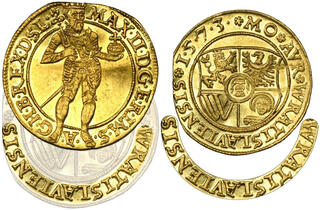| Salon Numizmatyczny Mateusz Wójcicki > Auction 13 | Auction date: 9 March 2024 |
| Lot number: 290 Price realized: 5,938 EUR (Approx. 6,509 USD) Note: Prices do not include buyer's fees. | Show similar lots on CoinArchives Find similar lots in upcoming auctions on |
| Lot description: Silesia, City of Breslau, Maximilian II, Ducat Breslau 1573 - VERY RARE, ILUSTRATED Very rare and beautiful municipal issue of a ducat of the city of Breslau. Coin illustrated in the catalog 'Gold of the Jagiellonian Dynasty' by Jarosław Dutkowski with a rarity level of R8. Attractive coin with plenty of mint luster. Moderate surface hairliness. Obverse: figure of the emperor facing right, holding the royal orb and a scepter MAX II DGER IM SAGHB REX D SL Reverse: coat of arms of the city of Wrocław MO AVR WRATISLAVIENSIS 1573 Gold, diameter 22 mm, weight 3.46 g Jarosław Dutkowski, in his study 'Gold of the Vasa Dynasty' in Volume III devoted to Silesia, writes about the Wrocław mint as follows : 'In the 16th century, the city of Wrocław very actively used its minting rights for over half a century. In 1560, the minting of city coins was limited. Occasionally at that time, the city mint minted a city coin, and at the request of the imperial chamber, also an imperial coin. In addition to circulation coins, the mint in Wrocław also minted occasional double ducats related to shooting tournaments organized by the Wrocław Fowler Brotherhood. During the reign of Emperor Rudolf II, the city council only twice issued ducats in 1582 and 1587. The Habsburgs were interested in limiting the rights not only of princes, but also of cities. This was even more important because the power in the city passed into the hands of Protestants, even though there was a Catholic bishopric here. Religious matters were the reason numerous conflicts in the Habsburg Empire. The conflict within the Habsburg family helped Czech and Silesian Protestants. Most Silesian princes also succumbed to the power of the Protestant religion. The Czechs had already taken advantage of the conflict of Emperor Maximilian (1564-1576), who was in dispute with his brother arch-Catholic rulers of Spain. There was a strong Protestant tradition in the Czech Republic, and Silesia also followed in the Czech footsteps. Bardzo rzadka i piękna emisja miejska dukata miasta Wrocław. Pozycja ilustrowana w katalogu 'Złoto czasów dynastii Jagiellonów' autorstwa Jarosława Dutkowskiego wraz ze stopniem rzadkości R8. W serwisie Onebid dwa notowania z lat 2010 i 2015, tego samego egzemplarza co prezentowany. Pięknie zachowana moneta z obustronnie zachowanym lustrem menniczym. Przetarte tło na awersie. Egzemplarz z końcówki blachy. Piękna moneta, która zachwyca świeżością lustra. Awers: postać cesarza zwrócona w prawo, trzymająca jabłko królewskie i berło MAX II D G E R IM S A G H B REX D SL Rewers: tarcza herbowa miasta Wrocław MO AVR WRATISLAVIENSIS 1573 Złoto, średnica 22 mm, waga 3.46 g Jarosław Dutkowski w swoim opracowaniu 'Złoto czasów dynastii Wazów' w Tomie III poświęconym Śląskowi, pisze o mennicy wrocławskiej tak: 'W XVI wieku miasto Wrocław bardzo aktywnie korzystało z posiadanych uprawnień menniczych przez ponad pół wieku. W 1560 roku wybijanie monety miejskiej zostało ograniczone. Sporadycznie w tym czasie mennica miejska biła monetę miejską, a na zlecenie kamery cesarskiej także monetę cesarską. Obok monet obiegowych w mennicy we Wrocławiu wybijano także okolicznościowe dwudukaty związane z turniejami strzeleckimi organizowanymi przez Wrocławskie Bractwo Kurkowe. Za panowania cesarza Rudolfa II, rada miasta tylko dwukrotnie wyemitowała dukaty w 1582 i 1587 roku. Habsburgowie byli zainteresowani ograniczeniem uprawnień nie tylko książąt, ale także i miast. Miało to tym istotniejsze znaczenie, że władza w mieście przeszła w ręce protestantów i to pomimo iż mieściło się tutaj katolickie biskupstwo. Sprawy religijne były powodem licznych zatargów w cesarstwie habsburskim. Konflikt w łonie rodziny habsburskiej pomógł protestantom czeskim i śląskim. Sile religii protestanckiej ulegli też większości książęta śląscy. Już wcześniej Czesi wykorzystali konflikt cesarza Maksymiliana (1564-1576), który był w sporze z braćmi arcykatolickimi władcami Hiszpanii. W Czechach silna była tradycja protestancka, śladem czeskim podążył też Śląsk.'Reference: Dutkowski 378-1 (R8), F.u.S. 3437, Friedberg 447 Grade: XF+ Starting price: 3547 EUR |  |


